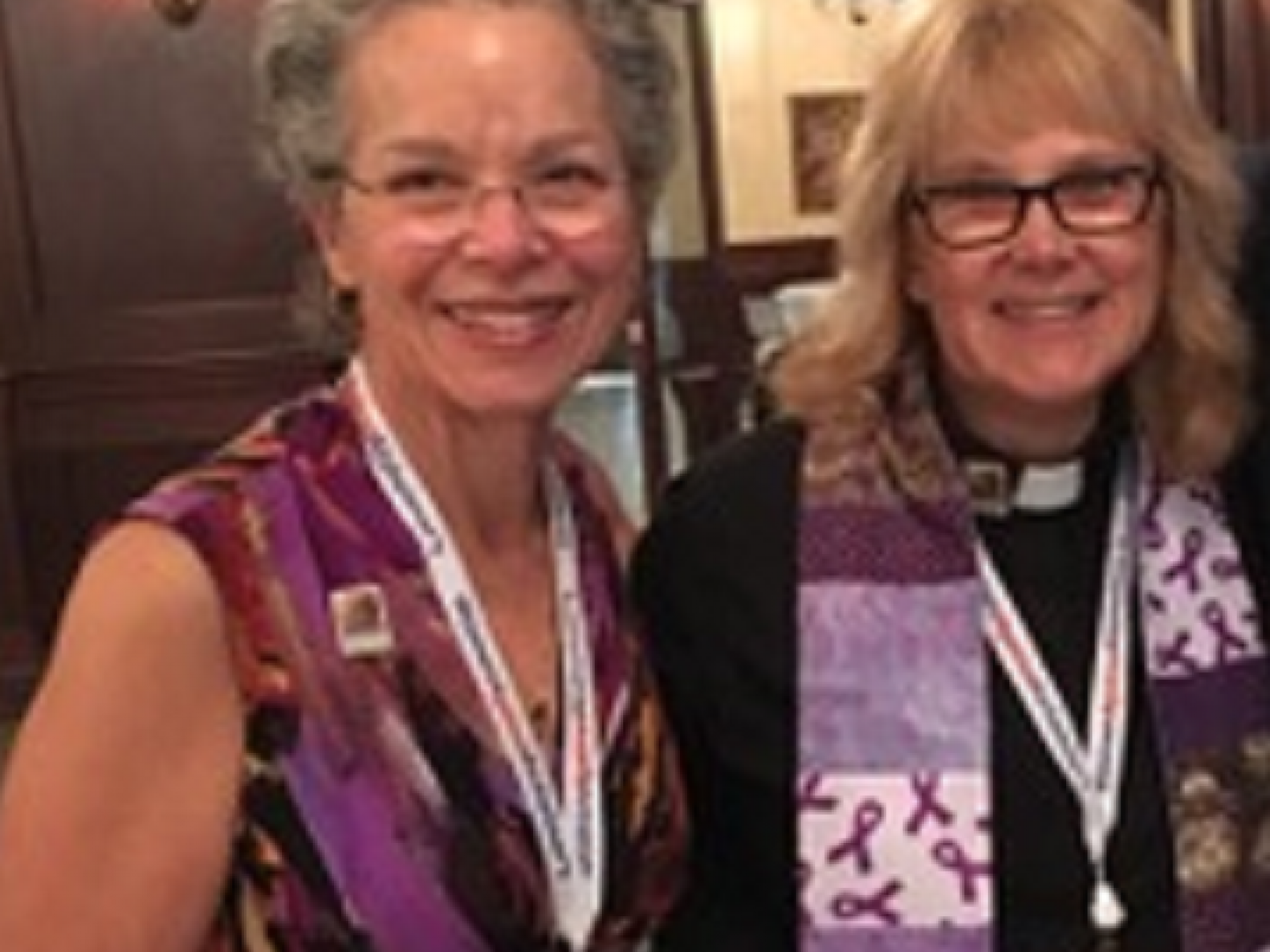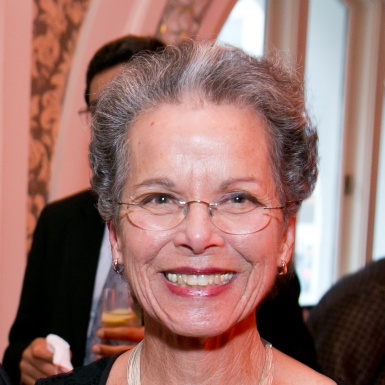Ending the Stigma

Sign up and receive information on the latest news and updates.
This past year my husband, Dr. Don Wendorf, and I have had the privilege of serving as Senior Editors for ClergyAgainstAlzheimer’s upcoming book, Dementia-friendly Worship: A Multifaith Handbook for Chaplains, Clergy and Faith Communities. It has afforded us many blessings, not the least of which has been to develop friendships with some amazing individuals, one of whom is Rev. Dr. Cynthia Huling Hummel, a Presbyterian (USA) pastor who is living with Alzheimer’s. Not surprisingly, our friendship and shared advocacy has deepened with the sharing of our thoughts, feelings and activities.
And, so, it came as no surprise to open our laptops and find this email from Cynthia earlier this week:
I just received a wonderful email from a friend, whom I haven’t seen in a while. We met years ago at a conference and discovered that we were both Pastors in small churches and also served as Chaplains for our local fire departments. Gosh, the two of us had so much in common, so much to talk about — so many stories to share and share we often did— well into many a night.
My friend had written to tell me of her recent surgery and included a photo of her raised leg wrapped in a blanket that she says I gave her seven years ago (Really?) when I officiated at her installation service. (Really?) Hmm. Interesting! She wrote to tell me what a comfort that blanket has been to her — that it has not only warmed her leg, but that it has warmed her heart with happy memories of our friendship and of my preaching at her installation service in 2011. 2011? Ohh. 2011 was the year I was diagnosed with Mild Cognitive Impairment. 2011 was the year I had to leave full-time ministry because of my faulty memory. 2011 was the year that I left my home and started a new life in a new town. 2011 was and is a fuzzy memory year. So many sad memories and so many lost memories.
I studied the photo of her leg, wrapped in the blanket, and tried to remember officiating at her installation and the blanket I gave her. But sadly, I have absolutely no memory at all of giving her that blanket. Nope. Not a single one. Honestly, the blanket didn’t even look familiar. And yet, I know in my heart that I gave it to her.
Anyway, I’ve been thinking a lot about the blanket—the one that I can’t seem to remember. It is wonderful (I suppose) that my friend remembers my gift, even if I can’t. But not remembering this gift bothers me.
This experience of being “reminded of memories” is happening more and more often. It’s unnerving. Sometimes, I look at a photo that I am in and have no recollection of ever being there. What was happening that day? Why can’t I remember it? These missing memories make me wonder and worry, what else have I forgotten? Lots! That’s what.
I used to pretend to remember so that others didn’t feel badly when I couldn't remember them or the occasion that they wanted me to remember.
I try NOT to do that anymore. Instead, I tell folks honestly, that I can’t/don’t remember. Sometimes my admission of NOT being able to remember something, leads to challenges: “BUT Surely you MUST remember!” But I don’t remember and I wonder to myself: “What part of ‘DON’T’ don’t you get?”
Trust me when I say it is sometimes easier to give in to lying (fake remembering) rather than argue about my inability to remember something!! Who wants to fight over a forgotten memory? I don’t!! Honestly, it’s crazy making!
Another friend recently chided me for not “going along,” in other words, for not “pretending to remember” because, as she put it, “that would have been the POLITE thing to do!” Really!? I didn’t feel polite in that moment. (Angry? You bet! Polite? No way! )
Have you ever been so angry that you just wanted to cry? That’s how I felt. I was incredibly angry at the situation. I was angry at myself for not remembering whatever it was that everyone wanted me to remember, angry at this woman for suggesting that I should lie to be polite and angry with others who prefer that I lie rather than make someone else feel uncomfortable — uncomfortable because I don’t remember them. Uncomfortable because I can’t remember them! WHAT THE HECK? What’s that about? I don’t get it and I don’t want to play this game anymore. Instead of insisting that I MUST remember, it would be nice, for once – for someone to say something (anything) that acknowledges my loss/pain/sadness instead of asking me to pretend that I remember something I don’t. I’m tired of pretending. I really cannot go there anymore.
When I calmed down, I wrote my friend and thanked her for her email, the photo, and her friendship, and for reminding me of a gift I’d long since forgotten — a gift of love, given in love. The memory she shared warmed my heart as she told the story of a special day that I was part of not so many years ago. ( I touched her heart! I touched her life! I still mattered!!
Cynthia’s email left both of us hurting for our friend and caused us to think about the demands we place upon our brothers and sisters who are living with this disease and the stigma — the disgrace — that endures. I have struggled with the word “stigma” — not really understanding all that it implies, but Cynthia’s email brought this concept home.
The disease is hard enough without the expectations we place upon those with dementia. It seems to me that in our “perfect” society we don’t have time or patience and certainly not compassion for anyone who doesn’t “perform" as we expect. How arrogant to expect someone to remember when they can’t and even to lie about it so that WE are protected and don’t have to face our own discomfort or vulnerability!
I learned this the hard way with my late husband, Richard. One day, with his back to me, he was looking out the kitchen window at the Smoky Mountains and proudly told me how he had hiked that whole long ridge that very day and it was so hard, and took all day, but he did it. As he was speaking, all I felt was panic, and as calmly as I could, I immediately went about setting him straight: “No, honey. You didn’t do that. You were here with me all day!” He turned around to look at me and simply said, “Why do you always have to be right?” That question was like an arrow through my heart. I thought, “I don’t. No, I don’t have to be right.” And from then on I never again corrected him. In my defense, I believe care partners do this because we think that if only we can get our loved ones to “get it right” then everything will be normal; it will be okay; we won’t have to go through this terrible loss together. If only...
Cynthia’s story is powerful and so sad. And her story is worth sharing more broadly as it speaks to our society’s desire to cover up, go along, get along vs. calling for us to have the courage and compassion to face this disease together and find ways to live with joy and connection now. When we sweep it under the rug and make light of it or pretend it’s not there, we miss the opportunity to be fully authentic with each other. True friends are not here for just the good times; we are here to offer strength and support at all times. And until we can face this disease together, the moments of joy and the moments of despair, we can’t come together and find ways for better care and cure.
One of the most devastating side effects of these diseases is that it tends to isolate the person living with dementia, along with their caregivers. This only serves to increase the terrible loneliness they often feel. When we try to bypass the awkward, embarrassing, challenging, painful, confusing moments we exacerbate the side effects and miss the opportunity for an intimate time of supporting, empathizing, and sharing of emotions that we all need. We may even leave them more lonely and isolated than they already are. By asking them to protect us from our discomfort, we may lose the chance to be partners in helping the affected individuals with their struggles and helping society work toward better treatments and prevention. So, please, let us give some thought as to how we might make things more comfortable for those for whom so many things have become so difficult. #EndTheStigma #EndAlzheimer's
